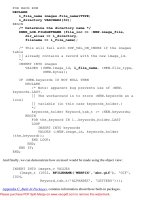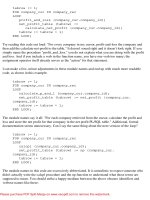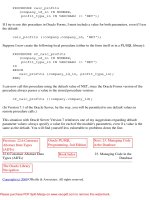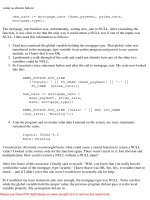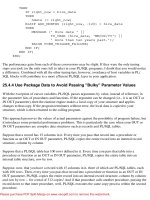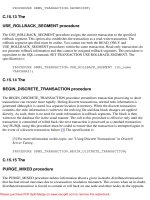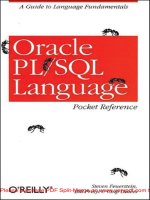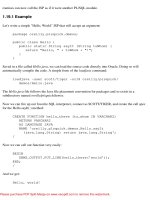Oracle PLSQL Language- P25
Bạn đang xem bản rút gọn của tài liệu. Xem và tải ngay bản đầy đủ của tài liệu tại đây (200.82 KB, 50 trang )
PROCEDURE calc_profits
(company_id_in IN NUMBER,
profit_type_in IN VARCHAR2 := 'NET');
If I try to use this procedure in Oracle Forms, I must include a value for both parameters, even if I use
the default:
calc_profits (:company.company_id, 'NET');
Suppose I now create the following local procedure (either in the form itself or in a PL/SQL library):
PROCEDURE of_calc_profits
(company_id_in IN NUMBER,
profit_type_in IN VARCHAR2 := 'NET')
IS
BEGIN
calc_profits (company_id_in, profit_type_in);
END;
I can now call this procedure using the default value of NET, since the Oracle Forms version of the
procedure always passes a value to the stored procedure version:
of_calc_profits (:company.company_id);
(In Version 7.1 of the Oracle Server, by the way, you will be permitted to use default values in
remote procedure calls.)
This situation with Oracle Server Version 7 reinforces one of my suggestions regarding default
parameter values: always specify a value for each of the module's parameters, even if a value is the
same as the default. You will find yourself less vulnerable to problems down the line.
Previous: 22.6 Construct
Abstract Data Types
(ADTs)
Oracle PL/SQL
Programming, 2nd Edition
Next: 23. Managing Code
in the Database
22.6 Construct Abstract Data
Types (ADTs)
Book Index
23. Managing Code in the
Database
The Oracle Library
Navigation
Copyright (c) 2000 O'Reilly & Associates. All rights reserved.
Please purchase PDF Split-Merge on www.verypdf.com to remove this watermark.
Previous: 22.7 Tips for
Parameter Design
Chapter 23
Next: 23.2 Transaction
Integrity and Execute
Authority
23. Managing Code in the Database
Contents:
Executing Stored Code
Transaction Integrity and Execute Authority
Module Validation and Dependency Management
Remote Procedure Calls
Managing Stored Objects with SQL*Plus
Using SQL to Examine Stored Objects
Encrypting Stored Code
You will either embed PL/SQL programs in your client-side application, as happens in the Oracle
Developer/2000 tools, or you will store your code in the Oracle database.
The term stored procedure commonly refers to code that is stored in the database. Along with
procedures, you can also store functions and packages, which can contain variables, cursors, record
structures, etc. Whenever you hear the term stored procedures, you should think "stored objects."
There are a number of benefits to storing an object in the database:
●
The database manages dependencies between your stored objects. For example, if a stored
function relies on a certain table and that table's structure is changed, the status of that
function is automatically set to INVALID and recompilation takes place, again automatically,
when someone tries to execute that function.
●
Any session with EXECUTE authority can execute the stored object. Whether you are in an
Oracle Forms application, a database trigger, or a batch process, that stored object is
accessible as long as the database is accessible. The compiled code for the object is made
available from the shared memory of the database instance.
●
You can execute a module stored in another (remote) database. This is known as a remote
procedure call, or RPC. The ability to execute code on a different database means that you do
not have to distribute application code to multiple databases in order to support distributed
applications.
Please purchase PDF Split-Merge on www.verypdf.com to remove this watermark.
●
Stored modules offer transaction-level security, which goes well beyond the table- and
column-level data and referential integrity offered by the database. With a stored module you
can make sure that transactions involving multiple tables and different steps are always
performed properly. This was actually one of the original motivations for the development of
the PL/SQL language.
●
Execution of a stored object shifts CPU load to the server. Rather than run your code locally
in a form or report, the stored object executes on the database server. Assuming that the server
is sized to handle the load, this shift could improve overall application performance. This
feature could be less of a benefit, of course, if the server is already heavily burdened.
Stored objects play an important role in today's client-server applications. The information in this
chapter will help you make the best possible use of stored objects.
23.1 Executing Stored Code
To execute a stored program unit, you must first store this program in the database. I'll explain this
CREATE OR REPLACE step later in this chapter. For now, let's take a look at what happens when
you run a stored PL/SQL program.
23.1.1 Executing Procedures
If you are working in SQL*Plus, you can execute programs directly from the command line. Use the
EXECUTE command to run procedures as follows:
SQL> execute calc_totals
Notice that you do not have to provide a semicolon. In fact, if you are going to use the EXECUTE
command, the entire PL/SQL procedure call must fit on one physical line. As soon as you press the
Enter key, the program executes.
You can also save a few microseconds (but accumulated over a whole year...) by providing only the
minimum number of characters for the EXECUTE command:
SQL> exec calc_totals
When you are executing a procedure within a PL/SQL block, you do not use the EXECUTE syntax.
You simply call the procedure, passing all necessary parameters within parentheses, and then
terminate the line of code with a semicolon. Here is the syntax for calling the calc_totals procedure
within a PL/SQL block:
BEGIN
calc_totals;
END;
Please purchase PDF Split-Merge on www.verypdf.com to remove this watermark.
You can also execute PL/SQL procedures in various "front-end" tools, such as Oracle Forms,
PowerBuilder, and many 3GL languages like C and COBOL. The syntax for calling procedures (and
functions) will vary from tool to tool. Within the Oracle Developer/2000 environment, you can call
stored programs from within a "native," albeit outdated, version of PL/SQL (see Appendix B, Calling
Stored Procedures from PL/SQL Version 1.1, for more information). From a language like C, you
will actually use a precompiler called Pro*C (from Oracle) and embed calls to PL/SQL programs
within a SQL execution block like this:
EXEC SQL EXECUTE
BEGIN
calc_totals;
END;
END-EXEC;
23.1.2 Executing Functions
The situation with functions is a little bit different. A function returns a value, so you can't just
execute it directly. If you try to run a function as if it is a procedure, you will get the following error:
SQL> exec total_sales (1997)
begin total_sales (1997); end;
*
ERROR at line 1:
ORA-06550: line 1, column 7:
PLS-00221: 'TOTAL_SALES' is not a procedure or is
undefined
ORA-06550: line 1, column 7:
PL/SQL: Statement ignored
If you want to run a function simply to view its return value, you can execute it within a call to
DBMS_OUTPUT.PUT_LINE as follows:
SQL> exec DBMS_OUTPUT.PUT_LINE (total_sales (1997))
Of course, this only works if the datatype of the return value of the function matches one of the
datatypes supported by DBMS_OUTPUT: number, string and date. For anything else, you will need
to execute the function within an anonymous block and then convert the value as necessary for
display. In the following example, I declare a PL/SQL table of strings to retrieve the value from a
function that returns all the foreign key information for a table. I then use a FOR loop to display that
information:
/* Employs PL/SQL 2.3 syntax for PL/SQL tables. */
DECLARE
TYPE strtabtype IS TABLE OF VARCHAR2(100) INDEX BY
BINARY_INTEGER;
Please purchase PDF Split-Merge on www.verypdf.com to remove this watermark.
strtab strtabtype;
BEGIN
strtab := primary_keys.for_table (`emp');
IF strtab.COUNT > 0
THEN
FOR tabrow IN strtab.FIRST .. strtab.LAST
LOOP
DBMS_OUTPUT.PUT_LINE (strtab.column_name);
END LOOP;
END IF;
END;
/
If I have saved this block in a file called myscript.sql, I can then execute this program and verify my
function's behavior as follows:
SQL> @myscript
NOTE: You might wonder why I placed my FOR loop inside an IF statement. Surely,
if there were no rows, the strtab.FIRST method would return NULL and the loop
would not execute. Yes and no. The FIRST and LAST methods do return NULL if the
PL/SQL table is empty, but oddly enough, if your numeric FOR loop range evaluates
to:
FOR tabrow IN NULL .. NULL
then the PL/SQL runtime engine does enter the loop and try to process the body
contents immediately. Then it raises an ORA-06502 VALUE_ERROR exception. So
you really want to put some conditional logic around those FOR loops if you think the
range endpoints might evaluate to NULL.1
Now that you've seen how to execute programs "from the outside," let's move inside and take a look
at the architecture Oracle employs to deliver that code to you for execution.
23.1.3 Memory-Based Architecture of PL/SQL Code
Whenever you start up an Oracle instance, a chunk (usually a rather large chunk) of memory is set
aside for the System Global Area or SGA. Various Oracle processes manage this area of memory to
do any of the following and more:
●
Retrieve data from the database and deliver it to user processes (a PL/SQL procedure
executing an explicit cursor, an Oracle Forms application querying records through a base
table block, an Internet HTML page utilizing the Oracle WebServer interface, and so on).
●
Change data and then manage the transaction processing (commits and rollbacks) based on
those changes.
Please purchase PDF Split-Merge on www.verypdf.com to remove this watermark.
●
Provide access to PL/SQL programs for execution in the server itself.
●
Transfer information between Oracle sessions using database pipes and database alerts.
When you use a stored program element (by executing a procedure or function or by making
reference to a nonexecutable part of a package like a constant or cursor), it must be accessible from
the SGA. So when you reference a program element, its compiled version is loaded into the SGA's
shared pool, if it is not already present. Then any program data associated with that element is
instantiated in your Program Global Area (PGA). At that point, the code can be executed or otherwise
used in your session.
The next time a session with execute authority on that program element references it, it will already
have been loaded and will therefore be available for execution.
When the SGA shared pool area fills up, code in the pool will be aged out (that is, room will be made
for newly requested programs) on a least-recently-used basis. Programs which are used often will
therefore most likely be available immediately upon request. You can also pin programs into shared
memory if you want to make certain that they will not be aged out. See
Chapter 25, Tuning PL/SQL
Applications, for more details on pinning.
Note that even if your compiled code is aged out of the SGA, any persistent, package-based data will
remain available in your PGA. In other words, code may be swapped out of the SGA, but program
data remains and persists for the duration of your session (or until you explicitly request a
reinitialization of your schema).
Figure 23.1 illustrates a number of the points covered in this section.
Figure 23.1: The System Global Area and Program Global Area
Please purchase PDF Split-Merge on www.verypdf.com to remove this watermark.
23.1.4 Key Concepts for Program Execution
Here are some basic principles to remember about program execution:
●
Compiled PL/SQL code is shared among all users with EXECUTE authority on that code.
Usually you will set up your environment so that one account or schema owns all the code for
an application. You then grant EXECUTE authority to other users on that code. When any of
those schemas runs this code, they are working with the same compiled code. Again, the data
instantiated and manipulated within those programs is specific to each connection.
●
When you reference any individual element in a package, the entire package is loaded into
shared memory. This can be both an advantage and a disadvantage. If you group together (in a
package) functionality which is usually executed in "close proximity," then you are more
likely to find the program you need in shared memory. This will speed up the completion of
your program.
On the other hand, suppose that you build some very large packages which contain programs
covering a disparate range of functionality. My application needs just one function out of the
100 procedures, functions, and cursors defined. Too bad! My SGA and my PGA must absorb
the full punishment of the package (both the room needed for the shared, compiled code and
all the package data instantiated in my PGA).
●
Program data instantiated within a program is stored in PGA for each user, rather than in the
SGA. This means that each user has his own copy of program data. If a procedure declares a
PL/SQL table and stuffs it full of 1000 strings, every user who executes that procedure has his
own copy of that table and its 1000 strings. The nice thing about this characteristic is that
gives you a fair amount of flexibility in finding the delicate balance between those ever-
Please purchase PDF Split-Merge on www.verypdf.com to remove this watermark.
competing resources: CPU and memory.
NOTE: The architecture in the multi-threaded server (MTS) is a bit different, but the
principle is the same: different users have their own copies of their program data.
●
Stored code runs under the authority of that code's owner, not that of the schema which is
executing the code. Suppose that you have stored all the code for your order entry application
in the SYSTEM account (a very bad idea, as this example will illustrate). You then grant
EXECUTE authority on that code to SCOTT, the traditional Oracle demonstration account,
which has very little power outside of doing whatever it wants with the emp and dept tables.
Now suppose further that the delall procedure of the ordent package allows you to delete all
orders from the application table. The intention is that only administrators will have the ability
to do that. In fact, the only account that can delete from the orders table at all is SYSTEM.
Once you have granted EXECUTE authority on ordent to SCOTT, however, all heck can very
decidedly break loose. For when a user logged in as SCOTT executes the ordent.delall
procedure, that user is, for that moment, acting as though she were connected to SYSTEM. All
rows are removed from the orders table!
You must, consequently, very careful about (a) the authority of the schema owning your
shared application code, and (b) to whom you grant EXECUTE authority on that code.
●
Even though stored code runs under the authority of that code's owner, the USER function still
returns the name of the schema currently connected to Oracle. The USER function does not,
in other words, return the name of the schema which owns the code in which the USER
function was called.
Previous: 22.7 Tips for
Parameter Design
Oracle PL/SQL
Programming, 2nd Edition
Next: 23.2 Transaction
Integrity and Execute
Authority
22.7 Tips for Parameter
Design
Book Index
23.2 Transaction Integrity
and Execute Authority
The Oracle Library
Navigation
Copyright (c) 2000 O'Reilly & Associates. All rights reserved.
Please purchase PDF Split-Merge on www.verypdf.com to remove this watermark.
Previous: 23.1 Executing
Stored Code
Chapter 23
Managing Code in the
Database
Next: 23.3 Module
Validation and Dependency
Management
23.2 Transaction Integrity and Execute Authority
The RDBMS and SQL languages give you the capability to tightly control access to and changes in
any particular table. With the GRANT command you can, for example, make sure that only certain
roles and users have the ability to perform an UPDATE on a given table. This GRANT statement
cannot, on the other hand, make sure that the UPDATEs performed by a user or application are done
correctly.
In a typical banking transaction, you might need to transfer funds from account A to account B. The
balance of account B must be incremented, and that of account A decremented. Table access is
necessary, but not sufficient, to guarantee that both of these steps are always performed by all
programmers who write code to perform a transfer. Without stored objects, the best you can do is
require extensive testing and code review to make sure that all transactions are properly constructed.
With stored objects, on the other hand, you can guarantee that a funds transfer either completes
successfully or is completely rolled back, regardless of who executes the process.
23.2.1 Execute Authority on Stored Objects
The secret to achieving this level of transaction integrity is the concept of execute authority (also
known as run authority). Instead of granting to a role or user the authority to update a table, you grant
privileges to that role/user only to execute a procedure. This procedure controls and provides access
to the underlying data structures (see
Figure 23.2). The procedure is owned by a separate Oracle
RDBMS account, which in turn is granted the actual update privileges on those tables needed to
perform the transaction. The procedure therefore becomes the gatekeeper for the transfer transaction.
The only way a program (whether an Oracle Forms application or a Pro*C executable) can execute
the transfer is through the procedure, so the transaction integrity can be guaranteed.
Figure 23.2: Transaction integrity with a PL/SQL code layer
Please purchase PDF Split-Merge on www.verypdf.com to remove this watermark.
In order for a stored procedure or package to compile (which occurs at the time of creation or
replacement), the owner of that program must explicitly be granted all the necessary privileges to any
objects referenced by the program. These privileges may not be granted simply to a role. If, for
example, procedure disp_customer issues a SELECT statement against the customer table, then the
owner of disp_customer must be granted a minimum of SELECT privileges on that table with an
explicit command:
GRANT privilege ON customer TO procedure_owner;
Requiring direct grants to individual Oracle users sometimes causes difficulty in environments where
grants are controlled carefully and efficiently through the use of roles. After all, the whole idea of the
role is to allow DBAs to move away from the onerous task of directly granting privileges to a myriad
of individual users. Yet every one of those users must execute the stored procedures underlying an
application. What's a DBA to do?
In some Oracle shops, a single account (user), which I'll call STOROBJ, is created in the production
environment. This user owns all stored objects and has update privileges on all tables, as is
appropriate. Other people who use the applications might have SELECT privileges on a number of
tables, and perhaps even update privileges on certain tables that are maintained through Oracle Forms
applications. But all complex transactions are bundled into stored procedures and stored functions,
and users are granted EXECUTE authority only to those stored programs. If an Oracle Forms screen
needs to perform a funds transfer, it calls the stored procedure and displays confirmation information
on the screen. The logic and authority would, however, reside in the database and be controlled
tightly by the STOROBJ account.
Please purchase PDF Split-Merge on www.verypdf.com to remove this watermark.
To grant execute authority on a stored object, you issue the following command (in SQL*Plus,
SQL*DBA, or another product that supports the issuing of DDL calls):
SQL> GRANT EXECUTE ON object_name TO user_or_role;
NOTE: You can only grant EXECUTE authority to an entire package, not to
individual programs within a package. Suppose that you build a single package to
encapsulate all SQL-based access to a table; this package contains procedures which
perform inserts, updates, and deletes, as well as cursors and functions to query data.
There is no way to grant "read-only" EXECUTE authority. A schema can either run all
programs in a package or none. As a result, you might want to build a single package
encapsulating all SQL against a table or view, but then build additional packages on
top of that "base" package which act as filters for certain classes of activity.
23.2.2 Creating Synonyms for Stored Objects
You should create public synonyms for each of the stored objects so that individual developers do not
have to reference the STOROBJ account name in order to access the programs. Suppose, for
example, that we have a funds transfer procedure, as follows:
PROCEDURE xfer_funds
(from_account_in IN NUMBER, to_account_in IN NUMBER,
transfer_amount_in IN NUMBER, transfer_status_out OUT
NUMBER);
Without a synonym, you would have to execute this procedure in this way:
storobj.xfer_funds (:old_acct, :new_acct, :xfer_amt, :
xfer_stat);
You should always avoid hardcoding the name of the owner of an object, be it a procedure or a table.
What if you need to change the account name? What if you decide to move the procedure to an
entirely different server and then need to execute this procedure as an RPC? Whenever you are
working with stored objects, you should create synonyms, as follows:
SQL> CREATE PUBLIC SYNONYM xfer_funds FOR storobj.
xfer_funds;
Now I can call the transfer procedure without making reference to its owner:
xfer_funds (:old_acct, :new_acct, :xfer_amt, :xfer_stat);
While it is possible to create a synonym for a standalone procedure, it is not possible to create a
synonym for a packaged procedure or function. You can, however, create a synonym for the package
Please purchase PDF Split-Merge on www.verypdf.com to remove this watermark.
itself. In effect, synonyms can be used to avoid having to provide the schema name of an object; you
cannot use it to avoid specifying the package name in which a program is defined.
Previous: 23.1 Executing
Stored Code
Oracle PL/SQL
Programming, 2nd Edition
Next: 23.3 Module
Validation and Dependency
Management
23.1 Executing Stored Code
Book Index
23.3 Module Validation and
Dependency Management
The Oracle Library
Navigation
Copyright (c) 2000 O'Reilly & Associates. All rights reserved.
Please purchase PDF Split-Merge on www.verypdf.com to remove this watermark.
Previous: 23.2 Transaction
Integrity and Execute
Authority
Chapter 23
Managing Code in the
Database
Next: 23.4 Remote
Procedure Calls
23.3 Module Validation and Dependency Management
Whenever you create or replace a stored object in the database, the PL/SQL engine compiles the
code. If the compile succeeds, then the following information is stored in the database:
●
The source code for the module, as you wrote it.
●
The tree structure of the module, a hierarchical representation of the original source code, with
a list of local and external references. The tree structure is used only by the compilation (and
automatic recompilation) process.
●
The pcode for the module, which is a list of instructions to the PL/SQL execution engine. The
PL/SQL execution engine uses the pcode to execute the module when it is called by a host
program.
When a module compiles, its status is set to VALID. This status is maintained in the SYS.OBJ$ table.
Upon compilation, the PL/SQL engine also has resolved all references to other database objects such
as tables and other stored programs. Each of these references constitutes a dependency for that
module. In other words, the validity of the module is dependent upon the validity of all objects on
which it depends. All dependency information is stored in the SYS.DEPENDENCY$ table.
NOTE: The tree structure, pcode, and dependency information is maintained only for
named modules. Anonymous blocks and database triggers are compiled only when
(and each time that) they are executed. The generated pcode for these objects is stored
directly in the shared pool of the database instance for as long as they are used, and
until they are erased from the System Global Area, using a least-recently-used
algorithm.
Starting with Oracle Server Release 7.3, triggers are compiled and their pcode stored in
the database.
23.3.1 Interdependencies of Stored Objects
A stored object must be VALID in order for its pcode to be loaded into the shared pool and executed
by the host program. As noted above, if the compile succeeds at create/replace time, then the status is
Please purchase PDF Split-Merge on www.verypdf.com to remove this watermark.
set to VALID. This status may, however, depend on other objects. Consider the following function:
FUNCTION full_name (employee_id_in IN NUMBER) RETURN
VARCHAR2
IS
first_and_last VARCHAR2(100);
BEGIN
SELECT first_name || ' ' || last_name
INTO first_and_last
FROM employee
WHERE employee_id = employee_id_in;
RETURN first_and_last;
EXCEPTION
WHEN NO_DATA_FOUND
THEN
RETURN NULL;
END;
Suppose that on Monday I save this function to the database. It compiles successfully and its status is
set to VALID. The PL/SQL compiler also adds a record in the DEPENDENCY$ table to indicate that
full_name is dependent on the employee table. Then on Tuesday, the DBA team adds another column
to the employee table. The Oracle Server automatically checks the dependencies for the employee
table and sets the status of all dependent objects to INVALID. This is a recursive process. Once
full_name is set to INVALID, then any modules calling full_name are also set to INVALID.[
1]
[1] An important exception to this "chain reaction" occurs with packaged modules. If,
for example, full_name was defined within a package called, say, "employee", then
even if the status of the full_name module is set to INVALID, no modules that call
full_name will be tagged invalid, unless the specification of full_name changed (which
it does not in this case). See the package examples and documentation on the disk for
more information about this extra protection provided by packages.
The next time a user runs the full_name function, the database notices that the status is INVALID. It
then calls the PL/SQL engine to compile the function. If the compile succeeds, then the pcode is
loaded to shared memory and the function runs.
Automatic Versus Manual Compilation
It is easy to see that the database does a lot of work for you by maintaining the stored object
dependencies and automatically recompiling objects as needed. You may not want to always depend
on such recompilation, however. There are two potential drawbacks to automatic recompilation:
●
The recompilation takes place at run time, when the user has requested an action. This means
that the user waits while PL/SQL does its thing. The pause should not be very noticeable for
small objects. Large packages can, however, take more than several seconds to compile. Do
Please purchase PDF Split-Merge on www.verypdf.com to remove this watermark.
you want your users to wait while this happens?
●
The recompilation can fail. What if the reason that the full_name function is INVALID is that
the employee table was dropped? The database cannot recover from such an error, as far as
full_name is concerned.
A much more sensible approach to take with stored object recompilation is to manually recompile all
INVALID objects before the user tries to execute those objects. This way the compilation time is
moved off-line and if any objects fail to compile, you can analyze and resolve the problem. To do this
manual recompilation you need to coordinate closely with the DBA group (if it is separate from the
application development team). You can determine which modules are INVALID by examining the
contents of the USER_OBJECTS or ALL_OBJECTS views. You could even generate the commands
necessary to recompile all INVALID PL/SQL objects with the following query:
SELECT 'ALTER ' || object_type || ' ' ||
object_name || ' COMPILE;'
FROM user_objects
WHERE object_type IN
('PACKAGE', 'PACKAGE BODY', 'FUNCTION',
'PROCEDURE')
AND status = 'INVALID';
Output from this query might look like:
ALTER PACKAGE PSGLOBAL COMPILE;
ALTER FUNCTION FULL_NAME COMPILE;
You could also force recompilation of a module by using the ALTER_COMPILE procedure in the
DBMS_DDL package (see
Appendix A, What's on the Companion Disk?, for more details), as
follows:
DBMS_DDL.ALTER_COMPILE ('package', 'SCOTT', 'FULL_NAME');
It is easy, when you use stored objects, to take for granted automatic management of these objects by
the database. You might scarcely notice the status of your objects and the recompilations that take
place behind the scenes.
That's cool. That's the whole idea. As you move your applications into production, however, you
would be well served to remember how the database works with your stored objects. That way, when
something goes wrong (very slow execution time under certain circumstances, for example), you
have some idea of how to fix it.
Please purchase PDF Split-Merge on www.verypdf.com to remove this watermark.
Previous: 23.2 Transaction
Integrity and Execute
Authority
Oracle PL/SQL
Programming, 2nd Edition
Next: 23.4 Remote
Procedure Calls
23.2 Transaction Integrity
and Execute Authority
Book Index
23.4 Remote Procedure Calls
The Oracle Library
Navigation
Copyright (c) 2000 O'Reilly & Associates. All rights reserved.
Please purchase PDF Split-Merge on www.verypdf.com to remove this watermark.
Previous: 23.3 Module
Validation and Dependency
Management
Chapter 23
Managing Code in the
Database
Next: 23.5 Managing
Stored Objects with
SQL*Plus
23.4 Remote Procedure Calls
One of the most important enhancements contained in PL/SQL Version 2.0 and all subsequent
releases is the ability to execute remote procedure calls or RPCs. A remote procedure (module) call
occurs when you execute a program from within one database that is stored in another database. To
execute a remote module, you simply attach a database link after the module name, as follows:
emp_name := full_name@new_york (:emp.employee_id);
The full specification for a remote module call is:
schema_name.[package_name.]module_name@database_link_name
where [package_name.] is the optional package name, necessary if the module is contained in a
package.
Just as you should hide the owner of a module with a synonym, you should do the same thing for
remote module calls. Programmers should never have to know where a module is located nor who
owns it. You should never want them to know because if that information is placed in a program, that
program is much more vulnerable to breakage. The very nature of a remote module call indicates that
the code can be moved to a different remote database. Never let a programmer hardcode such
information in a program.
When you call a remote module and it raises an exception, that exception is passed back as raised to
the calling program -- for all but user-defined exceptions. If your remote module raises a
NO_DATA_FOUND exception, your exception handler traps that error. If, on the other hand, your
module uses RAISE_APPLICATION_ERROR to raise a custom exception (error numbers between -
20000 and -20999), then that specific exception is lost in the translation back to the calling program.
Instead, error ORA-06510 is always returned to the local program.
Please purchase PDF Split-Merge on www.verypdf.com to remove this watermark.
Previous: 23.3 Module
Validation and Dependency
Management
Oracle PL/SQL
Programming, 2nd Edition
Next: 23.5 Managing
Stored Objects with
SQL*Plus
23.3 Module Validation and
Dependency Management
Book Index
23.5 Managing Stored
Objects with SQL*Plus
The Oracle Library
Navigation
Copyright (c) 2000 O'Reilly & Associates. All rights reserved.
Please purchase PDF Split-Merge on www.verypdf.com to remove this watermark.
Previous: 23.4 Remote
Procedure Calls
Chapter 23
Managing Code in the
Database
Next: 23.6 Using SQL to
Examine Stored Objects
23.5 Managing Stored Objects with SQL*Plus
You can use SQL*Plus to manage stored objects like database triggers, procedures, functions, and
packages. When Oracle7 was first released, SQL*Plus was the only way to create stored procedures.
With the advent of CDE and Oracle Procedure Builder, however, you now have a number of choices
for creating and updating your stored objects. Still, many of you will rely on SQL*Plus, especially if
your DBA activities are performed on a UNIX (or other non-Windows) server.
23.5.1 Creating Stored Objects
The syntax to create stored objects is as follows:
CREATE [OR REPLACE] PROCEDURE proc_name (param_list)
AS ... ;
CREATE [OR REPLACE] FUNCTION func_name (param_list)
RETURN datatype AS ... ;
CREATE [OR REPLACE] PACKAGE pkg_name AS ... ;
CREATE [OR REPLACE] PACKAGE BODY pkg_name AS ... ;
CREATE [OR REPLACE] DATABASE TRIGGER trig_name AS ... ;
Everything from the object name onwards has the same syntax shown in the appropriate chapter on
that object. The CREATE OR REPLACE syntax in front of the normal syntax indicates to SQL*Plus
that you want to create the object in the database. This is a DDL (data definition language) statement
in SQL, just like a CREATE TABLE statement.
You must create a package specification separately from the package body. In fact, you must create
the specification first, or else you receive the following error:
PLS-00304: cannot compile body of 'pkg_name' without its
specification
When an object is created, it is stored in a data dictionary table. The source for procedures, packages,
functions, and package bodies is kept in the SOURCE$ table (owned by SYS). Views into the
Please purchase PDF Split-Merge on www.verypdf.com to remove this watermark.
SOURCE$ table are:
ALL_SOURCE
Source for all objects to which you have access, and therefore EXECUTE privilege on that
object
USER_SOURCE
Source for all objects you have created
The statements executed by a trigger are stored in the ACTION column of the TRIGGER$ table
(owned by SYS). You can view all triggers you created by accessing USER_TRIGGERS, or all
triggers to which you have access by viewing the contents of ALL_TRIGGERS.
Even though you store your modules in the database, you do not maintain your source code for these
modules directly in their data dictionary tables. Instead, you must always keep the source code in text
files. If you need to make a change to an object, make the changes in the source code and then
replace the object in the database.
In order to distinguish regular SQL*Plus scripts from scripts that maintain stored objects, I employ a
different file extension for them, as shown in the following table:
File Type Extension
General SQL*Plus script <file>.sql
Testing script <file>.tst
Stored procedure <file>.sp
Stored function <file>.sf
Stored package body <file>spb
Stored package specification <file>.sps
23.5.2 Tips for Storing Code in Files
Please purchase PDF Split-Merge on www.verypdf.com to remove this watermark.
